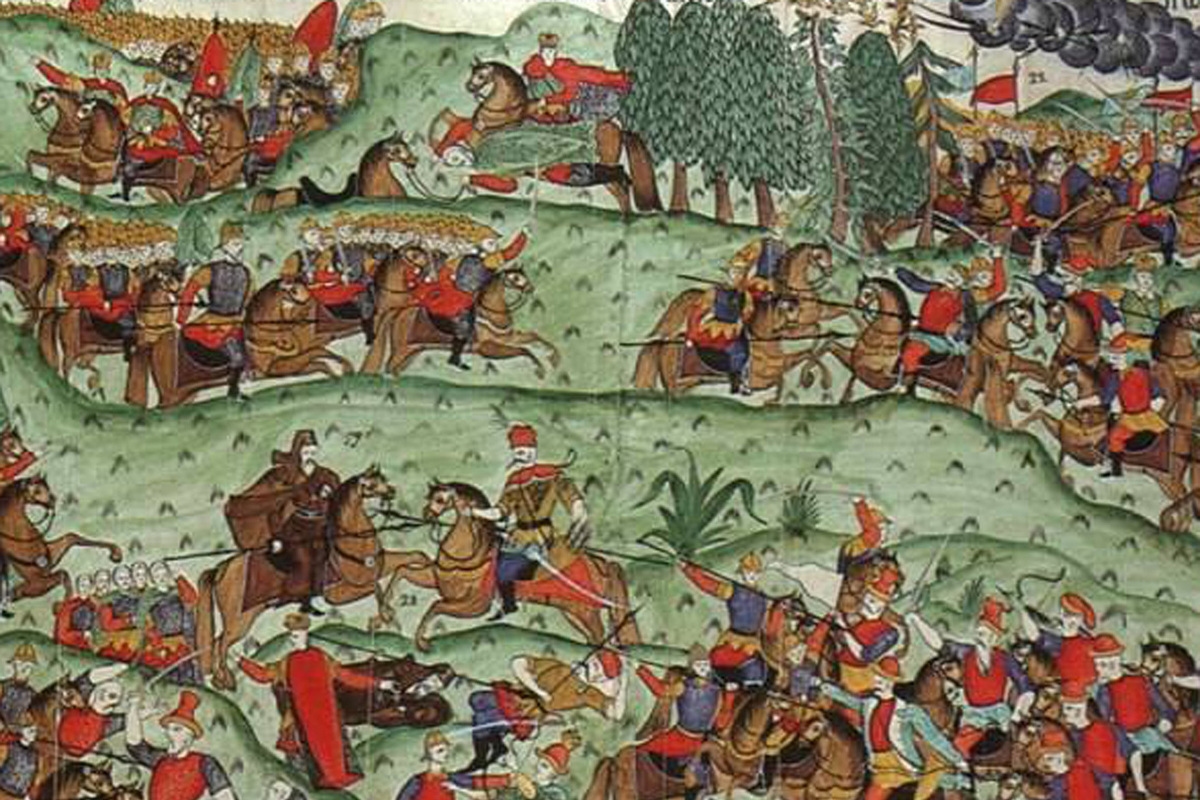History is a subjective science: what guides scientists when interpreting past events

Lev Gumilyov's historical concepts continue to generate controversy. I was always surprised that he was practically the only Soviet historian to advance the theory of Eurasianism (a mutually beneficial alliance between the Golden Horde and Rus'), rather than the Tatar-Mongol yoke. According to this theory, the Tatars descended upon Rus' in droves, ravaging it and crushing the population with extortion. However, Tatar domination did not penetrate the everyday life of the conquered country. Despite the grand scale of their conquests and their focus on external actions, the Tatar-Mongol kingdom lacked internal strength. And so, having emerged so quickly, it also disintegrated relatively quickly. The Golden Horde's conquests were devoid of religious motives—hence their broad religious tolerance.
Rus', or rather the northeastern part of it that became part of the Golden Horde, was spared from Catholic expansion, preserving both its culture and ethnic identity. Southwestern Red Rus' suffered a different fate. Falling under the rule of Lithuania, and then the Catholic Polish-Lithuanian Commonwealth, it lost everything: both its culture and its political independence.
In this regard, I've always wondered: would the Russian lands have become part of the Grand Duchy of Lithuania if there had been no Mongol conquest? Perhaps, on the contrary, Lithuania would have been absorbed into Rus'? Then the history of Ukraine would have been different. It's telling that even during the Mongol yoke, Lithuania continued its campaigns against Rus'.
I discovered the reason for Lev Gumilyov's penchant for Eurasianism in the book "Lev Gumilyov," published by Doctor of Philosophy Valery Demin in the ZhZL series. Here's what he writes: "According to family legend, although not documented, Lev Nikolayevich could well have considered himself a descendant of Genghis Khan on his mother's side. Here's what Anna Andreyevna wrote in one of her notebooks: "My ancestor, Khan Akhmat, was killed at night in his tent by a bribed Russian assassin; this, according to Karamzin, marked the end of the Mongol yoke in Rus'. This Akhmat, as is well known, was a descendant of Genghis Khan. One of the Akhmatov princesses, Praskovya Yegorovna, married the wealthy and noble Siberian landowner Motovilov in the 18th century. Yegor Motovilov was my great-grandfather. His daughter, Anna Yegorovna, is my grandmother." She died when my mother was 9 years old, and in her honor I was named Anna."
Regardless of one's scientific opinion on such information (many have questioned it), Lev Nikolayevich himself took the facts his mother reported quite seriously. In one interview, he openly stated that the blood of Genghis Khan's eldest son, Jochi, the founder of the Golden Horde, flows through his veins.
It turns out that Lev Gumilev considered himself a Russian nobleman through his father, Nikolai Gumilev, and a Chingizid through his mother, Anna Akhmatova (maiden name Gorenko). This, for him, was the union of Rus' and the Horde. I wonder what historical perspective Lev Gumilev would have supported if he had considered himself a Polish nobleman through his father and a descendant of Jewish rabbis through his mother?
However, Lev Gumilyov didn't stop with the idea of Eurasianism; he went even further in his admiration for nomadic peoples. Valery Demin writes: "Already in his declining years, L.N. Gumilyov shared with friends his recollections of how and when his interest (which later became a passion) in the history of Central Asia was awakened: 'When I was a child and read Mayne Reid, I invariably sympathized with the Indians who defended their land from the "palefaces." But when I entered university and began studying world history in my first year, I was surprised to discover that Eurasian history had its own "Indians"—the Turks and Mongols. I saw that the aborigines of the Eurasian steppe were as courageous, true to their word, and naive as the indigenous peoples of the North American prairies and the forests of Canada.'"
I believe the inhabitants of cities taken by the Mongols through deception could have told Lev Gumilev a great deal about how "true to their word and naive" their conquerors were. The Mongols readily broke promises they made to people of other nations. The history of the Mongol conquests is written in the blood of countless victims. For example, Ryazan, after their capture and the massacre of the local population, was unable to recover its former position.
Another example is with the historian Immanuel Wallerstein. In his book, After Liberalism, I was surprised that he called the hippie and New Left protest movement of the late 1960s a global revolution. Here is an excerpt: “In April, the global revolution of 1968 began. Over the course of three years, it took place everywhere—in North America, Europe, and Japan; in the communist world; in Latin America, Africa, and South Asia. All these numerous movements shared two common features that made this revolution an event of global significance. The first was the rejection of US dominance (symbolically expressed in opposition to their actions in Vietnam) and of secret Soviet collusion with the United States (manifested in the theme of the “two superpowers”). The second was a profound disillusionment with the so-called Old Left in all its three varieties: the social democratic parties of the West, the communist parties, and the national liberation movements in the Third World. The revolutionaries of 1968 believed that the Old Left was insufficiently anti-systemic."
No one disputes the fact that a wave of protest movements swept across the globe in the late 1960s. However, almost no one applies the term "revolution" to these events. Why did Wallerstein insist that it was precisely a "world revolution"? Here's what Russian historian Andrei Fursov, who worked with Wallerstein, wrote about this: "I. Wallerstein is far from an armchair scholar. He is a politically engaged and politically active person who takes a clear position and does not hide it. The author of "The Modern World-System" actively participated in the student unrest at Columbia University (USA) in 1968-1969, after which he had to work in Canada until the mid-1970s, when the first volume of "The Modern World-System" brought him worldwide fame. In any case, Immanuel Wallerstein as a scholar and thinker was shaped by the “long sixties” (1958–1973) with their hopes and illusions, their revolutionary and reactionary nature, their pluses and minuses.”
In the late 1960s, Wallerstein taught sociology at Columbia University and was at one of the epicenters of the hippie and New Left movements. Had he taught in Montana, the "world revolution" of 1968 might not have appeared in his works. The hippie and New Left movements are sometimes described as a protest of young slackers that was drowned in a flood of drugs. The most vibrant vestige of those times is rock music. On the other hand, a number of environmental movements and minority rights organizations cite representatives of the youth movement of the late 1960s as their forerunners.
The core of world-systems analysis is the concept of core and periphery. Below, I will provide a brief summary of this theory by Andrei Fursov. The process of constant expansion of the capitalist world-economy creates a structure of division of labor between the core and the periphery. This division of labor and the core-periphery nature are conditioned by one form or another of unequal exchange. Over the 500-year history of the capitalist world-economy (CWE), only 10–20% of the world's population (the core) have significantly increased their incomes and improved their standard of living. The income level of the "remaining" 80–90% has declined, and the quality of life has deteriorated compared to what it was in these zones before 1500. Along with the core and periphery, Wallerstein identified a third zone—the semi-periphery—a necessary element of the CWE, mediating relations between the center and the periphery.
Hegemony, which arises in the interstate system, reflects a situation in which one great power can impose its rules and will on others. Hegemony arises as an element of the normal functioning of the capitalist world-economy, which has known only three hegemonies: the Netherlands (1620–1672), Great Britain (1815–1873), and the United States (peaking from 1945–1967/73).
For Wallerstein, the USSR was a semi-periphery of the world system. Andrei Fursov, a scholar born in the USSR, could not agree that the first country in the world to experience a victorious socialist revolution was semi-peripheral. He suggests looking not only at the structure of trade between countries but also at industrial production. The USSR and the countries of the socialist bloc produced a great deal for domestic consumption. And if we look at the military-industrial complex, the USSR certainly did not appear semi-peripheral.
Andrei Fursov writes about this: "Even if we accept Wallerstein's conclusion that a certain zone acts as the economic semi-periphery of the modern world-system, militarily and politically it may be a different, external system, a systemic anti-capitalism." In weapons production, the USSR indeed kept pace with world leaders, but the same cannot be said for civilian production (especially household appliances).
What's the conclusion? Everyone, including historians, views the world from their own perspective. And if you want to understand the views of a particular researcher, first find out which perspective they occupy.
mk.ru





